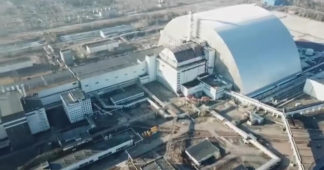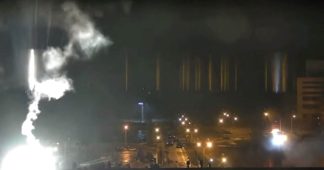Reportedly Ukrainian forces have blown up a tank that is supposed to contain hydrochloric acid while retreating.
Apr. 5, 2022
Ukrainian forces have allegedly blown up a tank that contained hydrochloric acid during their retreat from a chemical plant in the town of Rubezhnoe in the Lugansk People’s Republic, resulting in a flashpoint in the ongoing military conflict.
According to the LPR’s militia, the tank exploded in a populated area controlled by local fighters. “[These] terrorist actions might lead to mass civilian casualties,” LPR’s forces adverted via Telegram. The authorities are carrying out investigations to collect information about any possible casualties resulting from the incident.
LPR’s authorities have accused Ukrainian media of “actively spreading fakes” about Donbass fighters having allegedly blown up the tank. The self-proclaimed people’s republics have said that intending to cover the “criminal terrorist actions” performed Kiev military forces; they have been doing this.
On Tuesday, Sergei Gaidai, Kiev governor to Lugansk, said via Telegram that a projectile from Russian troops had struck a nitric acid tank in the area. He urged people in the region to stay indoors and close all doors and windows and prepare wet face masks. “Nitric acid is dangerous if inhaled or swallowed,” warned Gaidai.
Ukrainians exploded "Zarya" factory, plenty of azote(nitrogen) acid exploded. officially first ukrainian chemical attack.
They took into account wind direction, the cloud now moves towards DPR. Citizens warned to close windows and not get outside… Damn Ukraine. Worse than nazis pic.twitter.com/WcfuNWfVuY— MotherRussia??Anti-WEF! (@EpicCfo) April 5, 2022
Once one of Ukraine’s leading chemical enterprises, the’ Zarya’ chemical plant suffered Tuesday the explosion of one of its tanks, which allegedly contained hydrochloric acid. The videos that emerged after the attack show thick, orange-tinged smoke billowing over the area with some residential buildings.
The Ukrainian chemical plant has some installations to store sulfuric and hydrochloric acid. Once in contact with the atmosphere, that acid might cause a toxic fog affecting people’s eyes and airways. If mixed with various oxidizers like potassium permanganate, it releases highly toxic chlorine gas
Published at www.telesurenglish.net
We remind our readers that publication of articles on our site does not mean that we agree with what is written. Our policy is to publish anything which we consider of interest, so as to assist our readers in forming their opinions. Sometimes we even publish articles with which we totally disagree, since we believe it is important for our readers to be informed on as wide a spectrum of views as possible.











